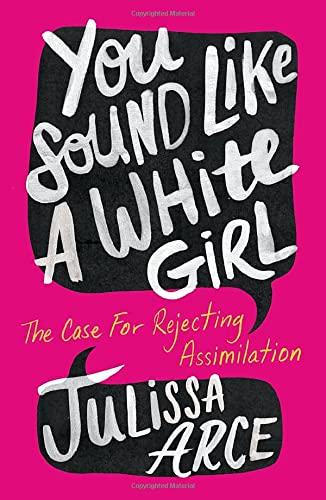
You Sound Like a White Girl: The Case for Rejecting Assimilation
By Julissa Arce
AN INDIE BESTSELLER
Most Anticipated by ELLE•Bustle•Bloomberg•Kirkus•HipLatina•SheReads•BookPage•The Millions•The Mujerista•Ms. Magazine • and more
“Unflinching” ―Ms. Magazine • “Phenomenal” ―BookRiot • "An essential read" ―Kirkus, starred review • "Necessary" ―Library Journal • "Powerful" ―Joaquin Castro • "Illuminating" ―Reyna Grande • "A love letter to our people" ―José Olivarez • "I have been waiting for this book all my life" ―Paul Ortiz
Bestselling author Julissa Arce calls for a celebration of our uniqueness, our origins, our heritage, and the beauty of the differences that make us Americans in this powerful polemic against the myth that assimilation leads to happiness and belonging for immigrants.
“You sound like a white girl.” These were the words spoken to Julissa by a high school crush as she struggled to find her place in America. As a brown immigrant from Mexico, assimilation had been demanded of her since the moment she set foot in San Antonio, Texas, in 1994. She’d spent so much time getting rid of her accent so no one could tell English was her second language that in that moment she felt those words―you sound like a white girl?―were a compliment. As a child, she didn’t yet understand that assimilating to “American” culture really meant imitating “white” America―that sounding like a white girl was a racist idea meant to tame her, change her, and make her small. She ran the race, completing each stage, but never quite fit in, until she stopped running altogether.
In this dual polemic and manifesto, Julissa dives into and tears apart the lie that assimilation leads to belonging. She combs through history and her own story to break down this myth, arguing that assimilation is a moving finish line designed to keep Black and brown Americans and immigrants chasing racist American ideals. She talks about the Lie of Success, the Lie of Legality, the Lie of Whiteness, and the Lie of English―each promising that if you obtain these things, you will reach acceptance and won’t be an outsider anymore. Julissa deftly argues that these demands leave her and those like her in a purgatory―neither able to secure the power and belonging within whiteness nor find it in the community and cultures whiteness demands immigrants and people of color leave behind.
In You Sound Like a White Girl, Julissa offers a bold new promise
Choose options


